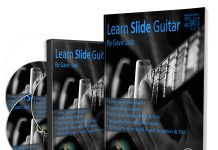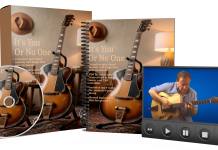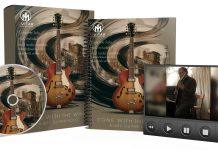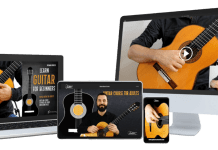This post may contain affiliate links. As an Amazon associate, Google associate as well as associate for other programs, Guitar & Music Institute may earn commissions from qualifying purchases.
Learning to play the guitar may seem like a daunting task, but with the right approach and dedication, anyone can master this versatile instrument. Whether you’re a complete beginner or have some experience playing, there are key principles and techniques that can help you unlock the joy of music and become a skilled guitarist. In this article, we will explore the path to effortless playing on the guitar, focusing on the fundamental steps and practices that will set you up for success. With a structured learning environment, regular practice, and a focus on the basics, you can start your journey to becoming a skilled guitarist – today.
Key Takeaways:
- Guitar lessons and beginner guitar tutorials are essential for learning to play the guitar.
- Developing the necessary dexterity and strength in your hands and arms is crucial for effortless playing.
- Relaxation, rather than complete tension-free, is important for achieving effortless playing.
- Scientifically proven methods such as exercise, meditation, and optimal learning environments can enhance your guitar learning experience.
- Patience, enjoying the process, and setting achievable goals are key factors in becoming a skilled guitarist.
The Path To Effortless Playing
Effortless playing on the guitar is a step-by-step process that requires a solid foundation. The first step is to develop the necessary musculature and dexterity in your hands and arms. This includes building strength, stretch, independence, and curvature in your fingers for the left hand, and the ability to produce maximum force on the strings without tension in the right hand. Many beginners struggle with these fundamentals, which can hinder their progress and lead to frustration. By focusing on developing these skills, you can lay the groundwork for effortless playing and pave the way for more advanced techniques and styles.
The Importance of Guitar Tutorials
When starting your guitar journey, it can be immensely helpful to take advantage of guitar tutorials. These online lessons or instructional videos provide structured guidance, allowing you to learn at your own pace. Guitar tutorials cover a wide range of topics, from basic chords and strumming patterns to more advanced techniques like fingerpicking and soloing. By following these tutorials, you’ll receive expert guidance, build a solid understanding of guitar techniques, and gain the confidence to explore different playing styles.
One of the most beneficial aspects of guitar tutorials is the ability to pause, rewind, and replay sections as needed. Unlike in-person lessons, you have the flexibility to revisit specific concepts or techniques until you’ve mastered them. Additionally, online tutorials often include visual demonstrations, tablature, and backing tracks to enhance your learning experience.
Effective Guitar Practice
Developing a consistent and effective guitar practice routine is essential for making progress and achieving effortless playing. By dedicating regular time to practice, you’ll reinforce muscle memory, improve finger strength and dexterity, and enhance your overall playing ability. Here are some key tips to make your practice sessions more productive:
- Set specific goals for each practice session, such as learning a new chord progression or mastering a particular technique.
- Break down complex songs or techniques into smaller, manageable sections.
- Practice slowly and gradually increase your speed as you become more comfortable.
- Focus on accuracy and precision rather than speed.
- Experiment with different rhythms, strumming patterns, and dynamics to add variety to your playing.
Exploring Guitar Chords
Guitar chords are the building blocks of music and mastering them is crucial for effortless playing. By learning different chord shapes and progressions, you’ll have the tools to play a variety of songs and styles. Here’s a table showcasing common guitar chords:
| Chord Name | Finger Placement |
|---|---|
| C Major | 1st finger: 1st fret of B string, 2nd finger: 2nd fret of D string, 3rd finger: 3rd fret of A string |
| G Major | 1st finger: 2nd fret of A string, 2nd finger: 3rd fret of low E string, 3rd finger: 3rd fret of B string |
| D Major | 1st finger: 2nd fret of G string, 2nd finger: 2nd fret of high E string, 3rd finger: 3rd fret of B string |
| E Minor | 1st finger: 2nd fret of A string, 2nd finger: 2nd fret of D string |
Making chord changes smoothly and quickly is a challenge for many guitarists. To improve your chord transitions, practice changing between different chords in a progressive manner. Start by focusing on two chords and gradually add more as you become comfortable. Additionally, practicing common chord progressions and strumming patterns will help solidify your understanding of how chords fit together in a song.
By following these steps, investing time in guitar tutorials, practicing effectively, and mastering guitar chords, you’ll be well on your way to effortless playing and unlocking your true musical potential.
Relax Into The Effort
Relaxation is a key element in achieving effortless playing on the guitar. While it may seem counterintuitive, relaxation does not mean being completely tension-free. Instead, it involves releasing unnecessary tension and finding the right balance between effort and relaxation. This can be achieved by using minimum muscle tension, maintaining whole-body awareness, and focusing on relaxing the body while making efforts with your fingers. By controlling overall body tension and understanding the dynamic relationship between your muscles and the strings, you can enhance your playing technique, speed, and control.
When it comes to guitar playing, incorporating relaxation techniques into your practice routine can greatly improve your skills. Here are some guitar playing tips to help you relax into the effort:
- Start with warm-up exercises: Before diving into complex guitar techniques, warm up your hands and fingers with simple exercises like finger stretches, hand rotations, and wrist movements. This will help loosen your muscles and prepare them for playing.
- Breathe deeply and consciously: Take deep breaths before and during your guitar practice sessions to oxygenate your muscles and promote relaxation. Focus on the sensation of your breath going in and out, allowing any tension to melt away with each exhale.
- Practice mindfulness: Cultivate a state of mindfulness while playing the guitar by being fully present in the moment. Pay attention to the sensations in your body, the sound of the strings, and the movements of your fingers. This will help you stay relaxed and connected to your playing.
- Use efficient and ergonomic playing techniques: Experiment with different hand positions and finger placements to find what feels most comfortable and natural to you. Avoid unnecessary tension in your hand and arm muscles by using minimal force to press down on the strings.
- Take breaks and stretch: Regularly interrupt your practice sessions with short breaks to stretch your fingers, hands, and arms. This will prevent muscle fatigue and stiffness, allowing you to maintain relaxation throughout your playing.
- Experiment with relaxation exercises: Incorporate relaxation exercises into your guitar practice routine, such as progressive muscle relaxation or deep relaxation techniques. These exercises can help release tension and promote a more effortless playing experience.
If you find yourself tensing up while playing, take a moment to pause and consciously relax your muscles. By practicing these relaxation techniques consistently, you will develop a greater sense of ease and fluidity in your guitar playing.
Recommended Resources
To further enhance your guitar skills and incorporate relaxation techniques into your practice routine, check out our range of free and paid guitar books and downloads at gmiguitarshop.com. These resources provide valuable insights, exercises, and tips to help you progress on your guitar-playing journey.

Scientifically Proven Ways To Learn Guitar Faster
When it comes to learning the guitar, there are various scientifically proven methods that can help you improve your skills more efficiently. By incorporating these methods into your practice routine, you can enhance your learning experience and make progress at a faster pace.
Create an Ideal Learning Environment
Setting up the right learning environment is crucial for effective guitar practice. Find a quiet and comfortable space where you can focus without distractions. Make sure your guitar is properly tuned and easily accessible. Surround yourself with learning materials, such as guitar books, sheet music, or online resources, to facilitate your progress. Having a dedicated space for practicing will allow you to fully immerse yourself in the learning process.
Incorporate Regular Exercise and Training
Physical exercise and training play a significant role in developing guitar skills. Engaging in regular exercise routines, such as finger stretching exercises or hand strength training, can help improve your dexterity and increase your ability to play complex chords and melodies. Incorporating specific exercises into your practice sessions will target areas of weakness and promote muscle memory, enabling you to play more effortlessly.
Understand Your Chronotype
Your chronotype refers to your natural habits and preferences for sleep and wakefulness. Understanding your chronotype can help you optimize your practice schedule for optimal learning. Some people are more productive and focused in the morning, while others excel during the evening. By aligning your practice sessions with your natural energy levels, you can maximize your concentration and retain information more effectively.
Meditation for Improved Learning
Meditation has been scientifically proven to enhance brain function, reduce anxiety, and improve focus. Incorporating short meditation practices into your daily routine before or after guitar practice can enhance your ability to learn and retain information. It promotes a calm and focused state of mind, allowing you to immerse yourself fully in the learning process and absorb new concepts more efficiently.
Chewing Gum for Brain Stimulation
Believe it or not, chewing gum can actually stimulate your brain and improve memory retention. Studies have shown that chewing gum increases blood flow to the brain and enhances cognitive function. Consider incorporating this simple activity into your guitar practice routine to boost your brain’s ability to process and memorize new chords, scales, or musical patterns.
Prioritize Sleep and Set Achievable Goals
Adequate sleep is essential for learning and skill retention. During sleep, our brains consolidate new information and solidify learning. Make sure to prioritize your sleep by establishing a consistent sleep schedule and aiming for 7-9 hours of quality sleep each night. Additionally, setting achievable goals in your guitar journey will keep you motivated and focused. Break down larger objectives into smaller, manageable milestones to track your progress and celebrate your achievements along the way.
By incorporating these scientifically proven methods into your guitar learning routine, you can accelerate your progress, enhance your skills, and achieve your musical goals more efficiently.

Benefits of Scientifically Proven Methods for Learning Guitar Faster
| Method | Benefits |
|---|---|
| Create an Ideal Learning Environment | Facilitates focus and concentration |
| Incorporate Regular Exercise and Training | Improves dexterity and technique |
| Understand Your Chronotype | Optimizes practice schedule for peak performance |
| Meditation for Improved Learning | Enhances brain function and reduces anxiety |
| Chewing Gum for Brain Stimulation | Improves memory retention and cognitive function |
| Prioritize Sleep and Set Achievable Goals | Enhances learning consolidation and maintains motivation |
Conclusion
Learning to play the guitar is an exciting journey that requires dedication and practice. By starting with the basics and finding the right guitar for you, you can lay a strong foundation for your learning. Create an optimal learning environment and incorporate effective learning methods to enhance your progress.
Remember to be patient with yourself and enjoy the process. Set achievable goals and learn songs that inspire you to stay motivated along the way. Playing the guitar should be a fun and enjoyable experience, so embrace the joy of creating music.
FAQ
Is learning to play the guitar a difficult task?
Learning to play the guitar may seem daunting, but with the right approach and dedication, anyone can master this versatile instrument.
What are the key principles for effortless playing on the guitar?
The key principles for effortless playing on the guitar include developing hand and arm dexterity, finding relaxation in your playing, and incorporating scientifically proven learning methods.
How can I develop hand and arm dexterity for playing the guitar?
Developing hand and arm dexterity involves building strength, stretch, independence, and curvature in your fingers for the left hand and producing maximum force without tension in the right hand.
Why is relaxation important for playing the guitar?
Relaxation is important for playing the guitar because it helps release unnecessary tension and allows for better technique, speed, and control.
How can I achieve relaxation in my playing?
Achieving relaxation in your playing involves using minimum muscle tension, maintaining whole-body awareness, and focusing on relaxing the body while making efforts with your fingers.
Are there any scientifically proven methods to learn guitar faster?
Yes, creating an ideal learning environment, incorporating regular exercise and training, understanding your chronotype, meditation can all enhance your learning experience.
What are some tips for staying motivated while learning the guitar?
Staying motivated while learning the guitar can be achieved by setting achievable goals, learning songs that inspire you, being patient with yourself, and enjoying the process.
How often should I practice the guitar?
Regular practice is key to improving your guitar skills. Aim for consistent practice sessions, whether it’s daily or several times a week.
What should be my focus as a beginner guitarist?
As a beginner guitarist, focus on building a strong foundation, learning basic chords, and practicing proper technique. These fundamentals will set you up for success as you progress.
Source Links
- https://guitardomination.net/14-scientifically-proven-ways-to-learn-and-master-the-guitar-faster-and-quicker-than-ever/
- https://riffjournal.com/effortless-guitar-playing-step-by-step/
- https://www.fender.com/articles/techniques/best-way-to-learn-guitar
This post may contain affiliate links. As an Amazon associate, Google associate as well as associate for other programs, Guitar & Music Institute may earn commissions from qualifying purchases.


























